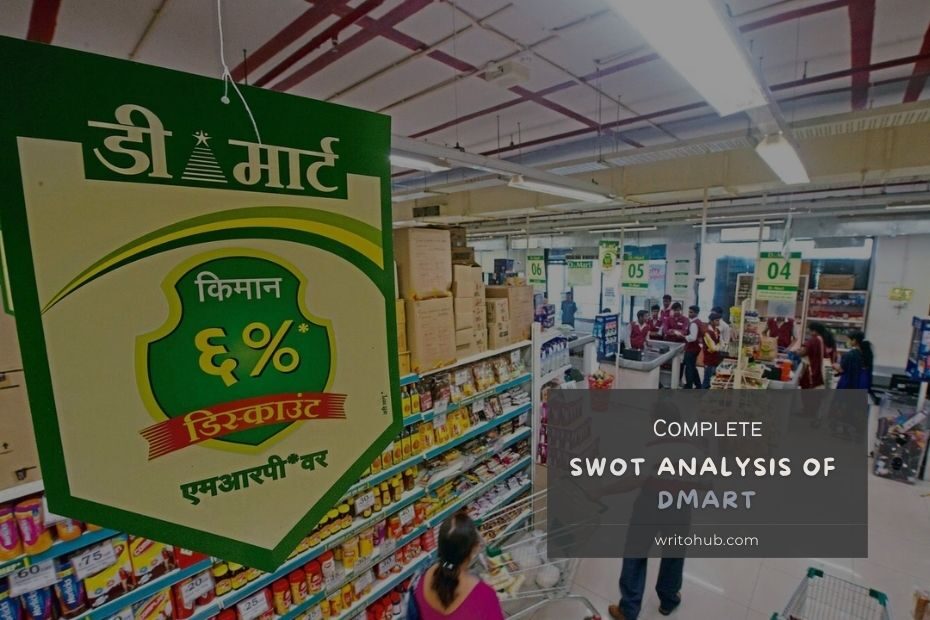DMart, established in 2002, is a prominent Indian retail chain known for its supermarket format and focus on value pricing.
Conducting a SWOT analysis of DMart allows us to assess its internal strengths and weaknesses, as well as external opportunities and threats.
This analysis provides insights into DMart’s current market position and helps identify strategic areas for growth and improvement.
Strengths in the SWOT Analysis of DMart
- Value Pricing and Discount Strategy: DMart’s value pricing strategy, offering products at competitive prices, resonates with cost-conscious consumers. The company’s ability to offer discounts and attractive deals contributes to its strong value proposition.
- Strong Supply Chain Management: DMart’s efficient supply chain management enables it to maintain optimal inventory levels, reduce costs, and ensure product availability. This efficient supply chain supports the company’s ability to offer competitive pricing and meet customer demands.
- Expanding Store Network: DMart has been expanding its store network across India. The company’s presence in various cities and towns allows it to reach a wide customer base and tap into emerging markets.
- Wide Product Range: DMart offers a wide range of products, including groceries, household items, apparel, and electronics. This diverse product range caters to multiple consumer needs, enhancing customer convenience and shopping experience.
- Customer Loyalty: DMart enjoys strong customer loyalty due to its value pricing, product quality, and efficient operations. The company’s focus on customer satisfaction and personalized service fosters long-term relationships with customers.
Weaknesses in the SWOT Analysis of DMart
- Limited Online Presence: DMart’s online presence and e-commerce capabilities are relatively limited compared to some of its competitors. Expanding its online platform and improving digital experiences can help capture the growing demand for online shopping.
- Regional Concentration: DMart’s store network is primarily concentrated in certain regions of India. This regional concentration may limit market penetration and leave untapped potential in other parts of the country.
Opportunities in the SWOT Analysis of DMart
- E-commerce Growth: The rapid growth of e-commerce in India presents an opportunity for DMart to expand its online presence and capture a larger market share. Investing in e-commerce infrastructure, enhancing digital capabilities, and offering convenient online shopping experiences can drive online sales growth.
- Store Expansion: DMart can continue expanding its store network in untapped markets and underserved areas. Expanding to new cities and towns enables the company to reach a wider customer base and capitalize on emerging consumer demand.
- Private Label Development: Developing and expanding DMart’s private label offerings can enhance its product portfolio, increase profit margins, and strengthen its value proposition. Offering exclusive and quality private label products can differentiate DMart from competitors.
- Digital Transformation: Embracing digital technologies, such as mobile apps and digital payment solutions, can improve the overall customer experience and streamline operations. Digital transformation initiatives can drive efficiency, convenience, and customer engagement.
Threats in the SWOT Analysis of DMart
- Intense Competition: DMart faces intense competition from both organized retail chains and local retailers. Competitors’ pricing strategies, product assortment, and aggressive marketing may pose a threat to DMart’s market share and customer loyalty.
- Changing Consumer Behavior: Consumer preferences and shopping habits are evolving, driven by factors such as convenience, online shopping, and experiential retail. Adapting to changing consumer behavior and preferences is essential to remain relevant and competitive.
- Regulatory Challenges: Compliance with various regulations, including taxation, labor laws, and product quality standards, can pose challenges for DMart. Ensuring compliance and addressing regulatory requirements is crucial to avoid legal complications and maintaining a positive brand image.
Conclusion
The SWOT analysis of DMart highlights its strengths, weaknesses, opportunities, and threats in the competitive Indian retail market.
DMart’s value pricing, strong supply chain management, expanding store network, wide product range, and customer loyalty position it as a leading retail chain.
Addressing weaknesses related to online presence and regional concentration is crucial for sustained growth.
Seizing opportunities in e-commerce growth, store expansion, private label development, and digital transformation can drive DMart’s success.
Mitigating threats from intense competition, changing consumer behavior, and regulatory challenges requires strategic planning, adaptability, and continuous focus on customer satisfaction.
By leveraging its strengths, addressing weaknesses, capitalizing on opportunities, and navigating threats, DMart can continue to provide value to its customers, offer affordable products, and maintain its position as a trusted and successful retail chain in India.
